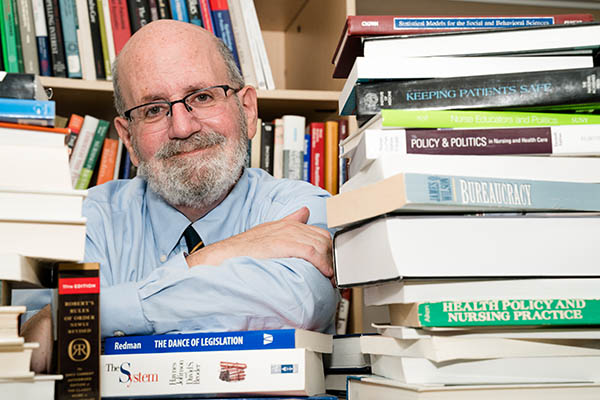Nursing came first for David Keepnews, who now has an alphabet of credentials behind his name: Ph.D., J.D., M.P.H., RN, NEA-BC, FAAN. He was working in San Francisco as a psychiatric mental health nurse in the early 1980s when a bureaucratic shift shaped the course of his career.
Dr. Keepnews worked with patients in a community mental health day program who occasionally required hospitalization. The transfer process went smoothly: patients were sent to the psychiatric emergency room at the county hospital and then transferred to the psychiatric unit at either the county hospital or a private hospital. Then one day, California’s state policy changed. Now these patients — those who didn’t qualify for Medicaid but didn’t have insurance — could only be admitted to the county hospital. Its psychiatric units filled up, and patients were left in the emergency room for days.
“It happened overnight. Why didn’t we see this coming? Why didn’t we oppose it?” said Dr. Keepnews, now a GW Nursing professor and program director for the school’s Doctor of Nursing Practice in Health Policy program. “This one change in reimbursement policy created a huge disruption and burden for our most vulnerable patients.”
The policy was eventually changed, but its impact steered Dr. Keepnews into enrolling in law school and a concurrent master’s degree in public health. After graduating from the University of California, Hastings College of the Law and the UC Berkeley School of Public Health, he worked in government relations for the California Nurses Association. His interests in law and public health then led him to a role as the director of policy at the American Nurses Association.
At ANA Dr. Keepnews immersed himself in U.S. policy decisions. In Washington, D.C., during the Clinton administration, Dr. Keepnews recalled national discourse surrounding access to care as then-President Bill Clinton tried to introduce reform measures. However, the issue wasn’t fully addressed and would resurface every few years.
“Meanwhile, the number of uninsured grew,” Dr. Keepnews said. “One of the problems with politics and policy in this country is that people have short memories. When we try to solve a problem and are unsuccessful, we ignore it. And it comes back even worse.”
After working in advocacy for eight years and seeing success as part of a team that helped ensure Medicare reimbursement for nurse practitioners and clinical nurse specialists, Dr. Keepnews went back to school. He earned a doctoral degree in social policy to gain a broader perspective on health policy and knew that research and evidence played a huge role in crafting policy.
Dr. Keepnews noted that many nurses see health policy as too complex for them to master and to help change. Attempting to change how nurses view policy, Dr. Keepnews started teaching and hasn’t stopped. Policy issues, even the complicated ones, should be accessible, he said.
“Nurses can understand policy. They need to understand it,” Dr. Keepnews said. “Policy can’t be just the province of a few self-declared ‘experts.’ Nurses need to feel empowered, and they need to know they can have an impact on issues.”
Advancing the relationship between nurses and policy is the work he’s most proud of, Dr. Keepnews said. “It’s a work in progress.”


